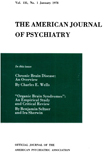Maladaptive cognitive structures in depression
Abstract
According to the cognitive view, the individual's negative and distorted thinking is the basic psychological problem in the depressive syndrome. The distorted cognitions are supported by maladaptive cognitive schemata, which involve immature "either-or" rules of conduct or inflexible and unattainable self-expectations. These schemata are probably acquired early in development and, if uncritically carried into adulthood, serve to predispose the individual to depression. Since these schemata are long-term identifiable psychological patterns that influence attitude and behavioral responses, they may constitute a cognitive dimension of the depression-prone individual's personality. The authors discuss the treatment implications of the cognitive approach to depression.
Access content
To read the fulltext, please use one of the options below to sign in or purchase access.- Personal login
- Institutional Login
- Sign in via OpenAthens
- Register for access
-
Please login/register if you wish to pair your device and check access availability.
Not a subscriber?
PsychiatryOnline subscription options offer access to the DSM-5 library, books, journals, CME, and patient resources. This all-in-one virtual library provides psychiatrists and mental health professionals with key resources for diagnosis, treatment, research, and professional development.
Need more help? PsychiatryOnline Customer Service may be reached by emailing [email protected] or by calling 800-368-5777 (in the U.S.) or 703-907-7322 (outside the U.S.).



